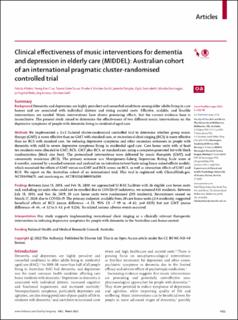| dc.description.abstract | Background Dementia and depression are highly prevalent and comorbid conditions among older adults living in care homes and are associated with individual distress and rising societal costs. Effective, scalable, and feasible interventions are needed. Music interventions have shown promising effects, but the current evidence base is inconclusive. The present study aimed to determine the effectiveness of two different music interventions on the depressive symptoms of people with dementia living in residential aged care. Methods We implemented a 2 × 2 factorial cluster-randomised controlled trial to determine whether group music therapy (GMT) is more effective than no GMT with standard care, or recreational choir singing (RCS) is more effective than no RCS with standard care, for reducing depressive symptoms and other secondary outcomes in people with dementia with mild to severe depressive symptoms living in residential aged care. Care home units with at least ten residents were allocated to GMT, RCS, GMT plus RCS, or standard care, using a computer-generated list with block randomisation (block size four). The protocolised interventions were delivered by music therapists (GMT) and community musicians (RCS). The primary outcome was Montgomery-Åsberg Depression Rating Scale score at 6 months, assessed by a masked assessor and analysed on an intention-to-treat basis using linear mixed-effects models, which examined the effects of GMT versus no-GMT and RCS versus no-RCS, as well as interaction effects of GMT and RCS. We report on the Australian cohort of an international trial. This trial is registered with ClinicalTrials.gov, NCT03496675, and anzctr.org.au, ACTRN12618000156280. Findings Between June 15, 2018, and Feb 18, 2020, we approached 12 RAC facilities with 26 eligible care home units and, excluding six units who could not be enrolled due to COVID-19 lockdowns, we screened 818 residents. Between July 18, 2018, and Nov 26, 2019, 20 care home units were randomised (318 residents). Recruitment ceased on March 17, 2020, due to COVID-19. The primary endpoint, available from 20 care home units (214 residents), suggested beneficial effects of RCS (mean difference –4·25, 95% CI –7·89 to –0·62; p=0·0221) but not GMT (mean difference –0·44, –4·32 to 3·43; p=0·8224). No related serious adverse events occurred. Interpretation Our study supports implementing recreational choir singing as a clinically relevant therapeutic intervention in reducing depressive symptoms for people with dementia in the Australian care home context. | en_US |

